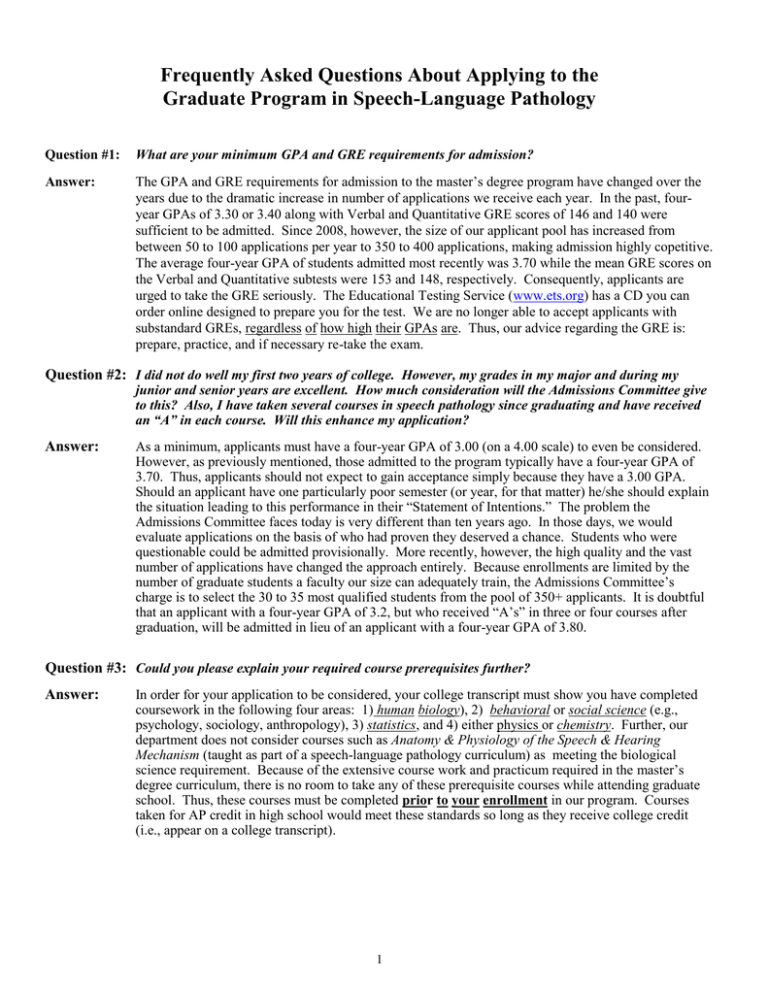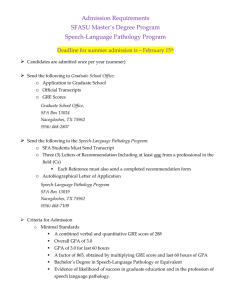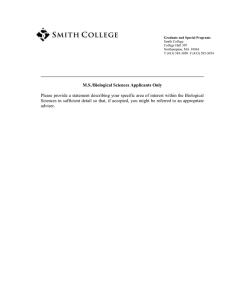Frequently Asked Questions About Applying to the
advertisement

Frequently Asked Questions About Applying to the Graduate Program in Speech-Language Pathology Question #1: What are your minimum GPA and GRE requirements for admission? Answer: The GPA and GRE requirements for admission to the master’s degree program have changed over the years due to the dramatic increase in number of applications we receive each year. In the past, fouryear GPAs of 3.30 or 3.40 along with Verbal and Quantitative GRE scores of 146 and 140 were sufficient to be admitted. Since 2008, however, the size of our applicant pool has increased from between 50 to 100 applications per year to 350 to 400 applications, making admission highly copetitive. The average four-year GPA of students admitted most recently was 3.70 while the mean GRE scores on the Verbal and Quantitative subtests were 153 and 148, respectively. Consequently, applicants are urged to take the GRE seriously. The Educational Testing Service (www.ets.org) has a CD you can order online designed to prepare you for the test. We are no longer able to accept applicants with substandard GREs, regardless of how high their GPAs are. Thus, our advice regarding the GRE is: prepare, practice, and if necessary re-take the exam. Question #2: I did not do well my first two years of college. However, my grades in my major and during my junior and senior years are excellent. How much consideration will the Admissions Committee give to this? Also, I have taken several courses in speech pathology since graduating and have received an “A” in each course. Will this enhance my application? Answer: As a minimum, applicants must have a four-year GPA of 3.00 (on a 4.00 scale) to even be considered. However, as previously mentioned, those admitted to the program typically have a four-year GPA of 3.70. Thus, applicants should not expect to gain acceptance simply because they have a 3.00 GPA. Should an applicant have one particularly poor semester (or year, for that matter) he/she should explain the situation leading to this performance in their “Statement of Intentions.” The problem the Admissions Committee faces today is very different than ten years ago. In those days, we would evaluate applications on the basis of who had proven they deserved a chance. Students who were questionable could be admitted provisionally. More recently, however, the high quality and the vast number of applications have changed the approach entirely. Because enrollments are limited by the number of graduate students a faculty our size can adequately train, the Admissions Committee’s charge is to select the 30 to 35 most qualified students from the pool of 350+ applicants. It is doubtful that an applicant with a four-year GPA of 3.2, but who received “A’s” in three or four courses after graduation, will be admitted in lieu of an applicant with a four-year GPA of 3.80. Question #3: Could you please explain your required course prerequisites further? Answer: In order for your application to be considered, your college transcript must show you have completed coursework in the following four areas: 1) human biology), 2) behavioral or social science (e.g., psychology, sociology, anthropology), 3) statistics, and 4) either physics or chemistry. Further, our department does not consider courses such as Anatomy & Physiology of the Speech & Hearing Mechanism (taught as part of a speech-language pathology curriculum) as meeting the biological science requirement. Because of the extensive course work and practicum required in the master’s degree curriculum, there is no room to take any of these prerequisite courses while attending graduate school. Thus, these courses must be completed prior to your enrollment in our program. Courses taken for AP credit in high school would meet these standards so long as they receive college credit (i.e., appear on a college transcript). 1 Question #4: Do the letters of recommendations really have to come from current or former professors? Answer: At least two of the three letters of recommendation must come from your college professors. The Admissions Committee is looking for evidence that you will be successful in graduate school. While letters from your employers, your minister, elected officials, or professional colleagues may attest to your character and work ethic as an employee, none of these individuals has had you as a student in a classroom or clinical setting. If you wish, a third letter may come from an employer, so long as it is in a professionally related area. Letters from individuals, other than your professors, provide little insight as to what type of graduate student you would be and, consequently, are not given much weight. Please note: letters from high profile, public officials do not enhance your application. In fact, there is a danger members of the Admissions Committee may react negatively, viewing such letters as an attempt to use political influence to gain entrance into the program. The Committee is interested in what you have accomplished as a student, not who your family knows. Question #5: What determines whether I begin my graduate studies in June or August? Answer: In order to begin your graduate program in August, you must have accumulated a minimum of 25 clock hours of supervised clinical observation plus completed the following coursework: Semester Hours 3 3 3 3 Course Title or Course Content Anatomy of the Speech & Hearing Mechanism Phonetics Normal Language Development Articulation Disorders The Admissions Committee will look specifically for these four courses on your transcript. If you believe you have taken these courses, but under a different title, you may be asked to supply a course syllabus and/or letter from your course instructor describing the course content. Please note that each of these topics must be for three semester hours credit. An undergraduate course that includes information on one or more of these subjects along with other topics does not satisfy the requirement. For example, some universities offer courses entitled “Disorders of Speech”, which includes articulation, stuttering, and voice. This is not the equivalent of a 3-hour course that deals solely with disorders of articulation. Do not be alarmed if you have not taken all of these courses. It will have absolutely no bearing on whether or not you are admitted into the program; only when you would begin. The Department has no quota for June or August enrollments. A note regarding observation hours: In order for clinical observation hours to count, they must have been obtained as either 1) part of a course in speech-language pathology or 2) a requirement for an undergraduate major in speech-language pathology. Observation hours that students obtain on their own (e.g., while doing volunteer work or “shadowing” a speech-language pathologist) do not count towards meeting this requirement. Again, 25 observation hours are not required for admission. They only determine when the student begins the master’s program (June or August). Question #6: What sort of advice can you give me regarding the Essay portion of the application? Answer: The Essay portion of the application is not an open-ended statement of intentions. Instead, applicants are asked to answer a set or questions. Because these will require some insight and forethought, it probably would be best if you first developed your responses as a Microsoft Word document, where you can edit them carefully and have another individual proof them. 2 Question #7: Does the Admissions Committee give preference to students who have majored in speech pathology as undergraduates? Answer: No. The Admissions Committee is seeking to select the 30 to 35 most outstanding applicants. Not everyone knows their ultimate career choice when they first enroll in college, and many students change majors. In fact, most colleges do not even have an undergraduate major in speech-language pathology. Having said that, however, what you have done to prepare yourself for this career choice is important. A major in speech pathology certainly helps you make an informed decision and prepares you for what lies ahead as both a graduate student and future professional. There are, nonetheless, numerous avenues for non-speech pathology majors to show evidence they have investigated the profession thoroughly and educated themselves about graduate programs. Each year, as many as half of applicants admitted to our master’s program majored in something other than speech-language pathology as undergraduates. Question #8: Once the Admissions Committee has completed its review of all applications, what happens next? Answer: The members of the Admissions Committee independently (i.e., without input or discussion from other faculty or members of the committee) assign each applicant a rating. Applicants are then ranked and, starting with the highest ranked applicant, acceptance letters are systematically sent out until we have received commitments from the 35 students who will comprise the incoming class. Once all slots have been filled, denial letters are sent out to the remaining applicants. The acceptance process (the time between when the first and last student is admitted) takes a little over one month. If you are admitted to the master’s degree program, you will receive a letter so stating along with a specific set of instructions. You will be given a specified period of time to send us a signed Letter of Intent (included in your acceptance materials) along with a non-refundable check for $1,000. Your check reserves your slot in the entering class and is applied to the Graduate Enrichment Fee (required of all incoming students). Receipt of this check lets us know who is committed to attending our master’s program and, therefore, how many more applicants we are able to admit. Because so many applicants are waiting to hear from us regarding their disposition, we are unable to grant additional time for receipt of your check. Important: It is our expectation that each applicant has thoroughly examined our speech-language pathology program before applying and is serious about attending. It is quite disturbing when an applicant, upon being admitted, requests extra time stating, “Before I can make a commitment I need to come for a visit and learn more about your program.” That is the type of preparation that should have been done long before a student submits his/her application. Some students take advantage of the opportunity the internet provides by blindly applying online to a dozen or so programs, with the intention of investigating, after the fact, those programs in which they have been admitted. Our department is not interested in being participants in such a process. As a policy, we do not conduct post-admit interviews. Question #9: What final advice can you offer regarding the application? Answer: The Admissions Committee considers several criteria when reviewing an application, one of which is your ability to use common sense and follow directions when completing the application. It does not speak well of an applicant’s ability to process and integrate information if they cannot follow clearlystated instructions. For example, our application deadline is January 1st of the year you wish to enroll. Only those applications that are complete by that date are reviewed by the Admissions Committee. Because most universities close by the second week in December, it is highly unlikely that an application submitted at the end of November will make the application deadline. As Graduate Director, I make note of the date at which an application was submitted. After all, wouldn’t an individual who waits until the last minute to apply to graduate school also wait until the last minute to study for an exam, write a paper, or prepare for therapy? How you conduct yourself during the application process is a direct reflection of the attitude you would bring to a graduate program. 3


